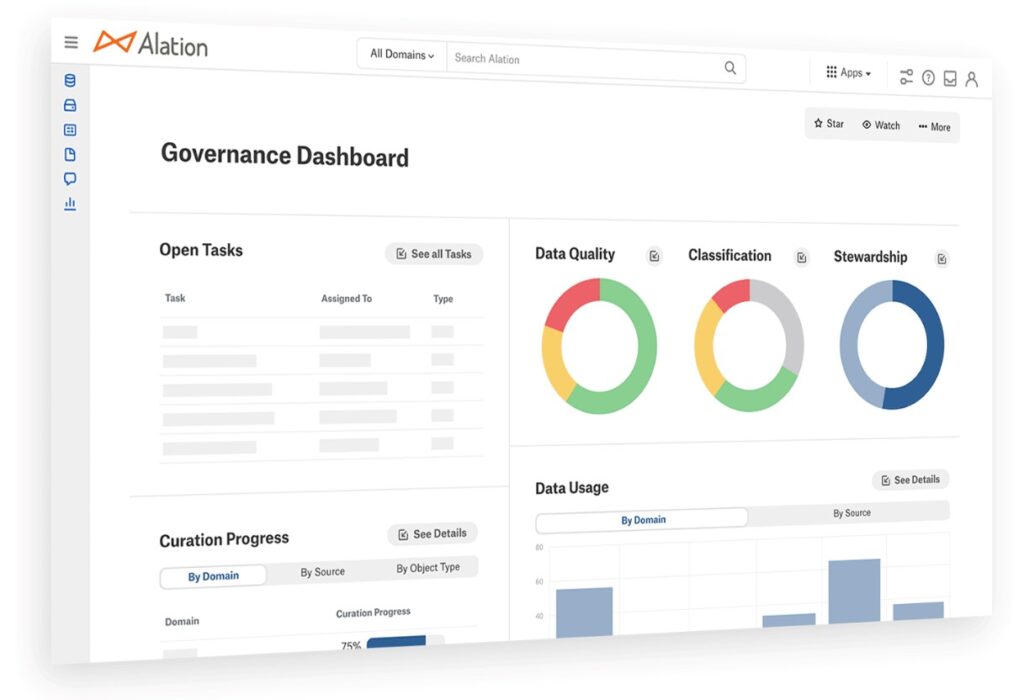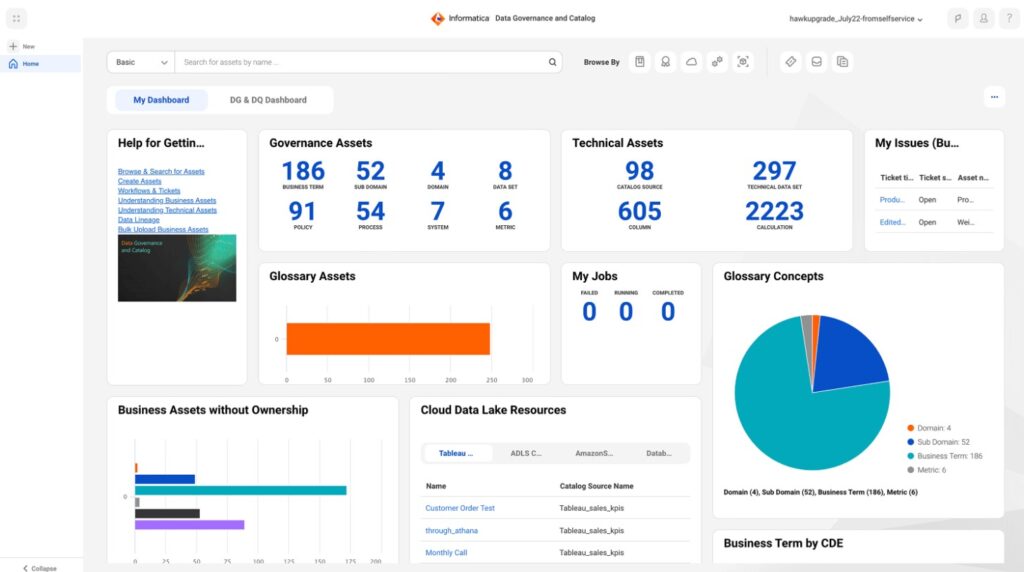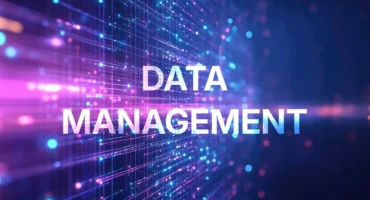
Angsuman Dutta
CTO, FirstEigen
12 Top Data Governance Tools & Software for 2025
Is your organization looking to employ new data governance tools in the coming year? Data governance is necessary to ensure the accurate and reliable information your company needs to make the best possible business decisions. When you want robust data governance, here are 10 top-rated software solutions to consider, all of which can help your organization gain more control over its valuable data assets.
Quick Takeaways
- Data governance affects the availability, quality, usability, and security of your company’s data
- The best data governance tools include data discovery, data classification, metadata management, and real-time data quality management
- The top data governance software today includes Alation, Zeenea, Informatica, Atlan, Cloudera, and Talend
- All the tools lack capabilities to establish trustability of data. Users can connect with tools like DataBuck, which autonomously calculate Data Trust Scores for all data assets everywhere in the pipeline, and sends alerts when the trust score trend is low. Users get an accurate measure of reliability, usability and trustability of all data sets.
What is Data Governance and Why is It Important?
Data governance is the process of managing the availability, quality, usability, and security of an organization’s data. It employs a variety of policies and standards to determine data owners, control data usage, dictate intended uses for data, and enforce data security rules.
The primary goal of data governance is to ensure the high quality of data throughout the organization and guarantee that data is both easily accessible and secure.
Data governance is important to ensure:
- Data reliability and quality
- Data consistency across all of an organization’s key systems
- Regulatory compliance
An organization’s data governance program typically includes a steering committee, governance team, and data stewards. These groups work together to create the standards and policies that govern how an organization uses its data.
Get Started With the Perfect Data Governance Tool Today
Benefits of Using an Enterprise-Wide Data Governance Tool in Highly Regulated Industries?
In today’s complex regulatory landscape, industries ranging from finance to healthcare require robust data governance solutions. Using an enterprise-wide data governance tool can offer numerous advantages:
- Comprehensive Data Management:
- Integrate various elements such as data quality, master data management (MDM), and data cataloging into a single platform.
- Seamlessly manage data integration and reference data, ensuring consistency and accuracy across the organization.
- Enhanced Data Observability:
- Gain insights into data health and performance, helping identify and rectify issues quickly.
- Monitor data flows and usage patterns, which is crucial for maintaining compliance and operational efficiency.
- Regulatory Compliance:
- Keep detailed audit trails for data activity, crucial for meeting compliance requirements.
- Implement role-based security to control data access, ensuring that sensitive information is protected and only available to authorized personnel.
- Data Storytelling and Decision Support:
- Utilize data storytelling modules to transform raw data into actionable insights and compelling narratives.
- Empower decision-makers with the necessary tools to make informed choices based on reliable data intelligence.
- Scalability and Flexibility:
- Design systems that cater to large-scale deployments, suitable for enterprises with substantial data needs.
- Adapt to specific industry regulations and requirements, minimizing disruptions and enhancing operational efficiency.
By leveraging such tools, organizations can enhance their data governance strategy, ensuring they not only meet regulatory requirements but also unlock the full potential of their data assets for strategic advantage.
What Features Should You Look For in Data Governance Software?
When you’re looking for data governance software for your organization, you look for tools that include the following important features:
- Data discovery
- Data classification
- Metadata management
- Real-time data quality monitoring and management
- Data lineage tracking and observability
Your organization may not need all of these features, but they’re a good place to start your evaluation. You should also consider how easily a given solution integrates with your current systems and other best of breed tools. No tool is good at all the above, they are usually good at one or two capabilities and should have the ability to connect with complementary tools. Some tools like Collibra have closed their ecosystem and do not have many best of breed partners to complement them. Such tools did not make it in this list.
Selecting the right data governance tool is crucial for your organization’s success in managing, securing, and utilizing data effectively. With many options available, narrowing down your choices requires evaluating the following key factors:
1. Integration Capabilities
Your data governance tool should integrate seamlessly with your existing data infrastructure, including databases, cloud platforms, and analytics tools. Check for compatibility with platforms like Snowflake, BigQuery, or AWS and ensure the tool supports APIs or connectors that simplify integration. A well-integrated tool can streamline workflows, reduce data silos, and maximize operational efficiency.
2. Scalability
As your organization grows, so does the volume and complexity of your data. Choose a tool that can scale to accommodate future needs, such as handling larger datasets, incorporating additional data sources, and supporting more users or departments. Scalable solutions prevent the need for frequent replacements, saving time and resources in the long run.
3. Ease of Use
The best tools are designed for both technical and non-technical users. A user-friendly interface with clear navigation, dashboards, and automated features ensures that all stakeholders—data engineers, analysts, and business users—can effectively interact with the tool. Tools that require minimal training or coding expertise foster widespread adoption across teams.
4. Cost Efficiency
Evaluate the total cost of ownership, including licensing, implementation, training, and ongoing maintenance. A cost-efficient tool delivers robust features and functionality without straining your budget. Consider the value added by the tool in terms of improved data quality, enhanced compliance, and time saved on manual tasks.
By focusing on these factors, you can identify a data governance tool that not only meets your current requirements but also supports your organization’s growth and evolving data governance strategy.
How Data Governance Tools Empower Policy and Standards Management?
Data governance tools are instrumental in shaping and maintaining robust governance policies and standards for organizations. These tools streamline the entire governance process by automating key elements, ensuring efficiency and consistency across the board.
Key Functionalities of Data Governance Tools
- Data Catalogs and Business Glossaries: These tools help organizations create comprehensive data catalogs and business glossaries, offering a centralized repository that standardizes definitions, terms, and metadata, thus, reducing ambiguity and enhancing communication.
- Data Mapping and Classification: By providing sophisticated data mapping and classification features, organizations can easily identify, organize, and categorize their data assets. This clarity facilitates the enforcement of policies by ensuring data is aligned with regulatory and internal standards.
- Workflow Management and Collaboration: Effective governance relies on streamlined workflows. These tools offer advanced workflow management capabilities, enabling seamless collaboration among data stewards, analysts, and decision-makers. This collaboration is crucial for developing and maintaining up-to-date policies.
- Process Documentation: Comprehensive documentation features aid in the creation and maintenance of process records, ensuring that every action aligns with established policies and standards. This documentation is invaluable for audits and continuous improvement initiatives.
Integration With Other Systems
Data governance tools often integrate with data quality tools, master data management (MDM) systems, and metadata management platforms. This integration ensures that policies and standards aren’t just theoretical but are actively applied and monitored across the entire data lifecycle.
By leveraging these tools, organizations not only develop robust governance policies but also ensure that these standards are consistently applied, leading to improved data integrity and trustworthiness.
Achieve Seamless Data Governance With FirstEigen's DataBuck
Top Data Governance Tools and Software for 2025
There are numerous tools available to help with the task of data governance. Organizations use a variety of these tools, working separately and together, to help ensure data standards and data quality across all of an enterprise’s businesses and teams.
The following data governance tools and software are among the most popular today. Put these solutions on your list to evaluate your company’s data governance needs.
Alation
Alation Data Catalog is a data intelligence solution that uses machine learning to analyze, index, and manage data from a wide variety of disparate sources. It takes data from relational databases, data lakes, and the like and makes it easily discoverable and retrievable. Data can be searched via natural language SQL queries. Alation’s open DQ initiative integrates autonomously calculated Data Trust Scores from FirstEigen’s DataBuck for all data assets, and alerts users when the trust score trend is low. The user gets an accurate measure of the usability of all data sets for their use. Alation is one of the most popular data governance tools today, counting companies such as Cisco, Pfizer, and Salesforce among its customers.

Alteryx
Alteryx Designer is a platform for discovering key data, preparing that data for use, and analyzing that data. It enables collaboration among a broad array of users, from business management and C-level executives to data analysts and IT staff. It enables companies to embed several different models into their business processes. Not designed for establishing Data Trust Scores, best used as a Data Wrangling tool.
Atlan
Atlan offers a modern data workspace platform that includes data governance, data cataloging and discovery, data quality management, and data integration. It includes automatic data profiling, an easy-to-use data search interface, and granular access and data governance controls. It’s an ideal platform for frictionless collaboration across business disciplines. Laborious to manually create individual data validation rules. Its key value is in the catalog and not in automating data validation rules.
Cloudera
Cloudera offers several data governance and management tools, including Data Warehouse, Enterprise Data Hub, and Cloudera Navigator, which provides Apache Hadoop data governance. Navigator includes a search-based interface for data discovery, lineage, policy enforcement, and metadata management.
Dataddo
Dataddo is a cloud-based extract, transform, and load (ETL) solution that plugs into an organization’s existing data stack. It includes an intuitive interface that both technical and non-technical users can employ to quickly create efficient and powerful data pipelines. It includes a variety of data connectors that minimize the need to attach unnecessary components to an organization’s data architecture.
Immuta
Immuta is an automated data governance and security platform that lets users create no-code data policies. It offers controlled collaborative workspaces for sharing data, along with versatile permission management. It can run on-premises or in the cloud.
Informatica
Informatica’s cloud-based data management platform is an automated data governance solution that helps users discover, access, and analyze curated data. It includes tools for visualizing data lineage, monitoring data quality, and ensuring compliance with GDPR and other privacy regulations. Its laborious and manual processes to establish the trustability of data has been a downer for most users, especially in the modern data stack. Informatica users have overcome this limitation by adopting ML-powered intelligent platforms like FirstEigen’s DataBuck to autonomously calculate Data Trust Scores for all data assets, and alert users of suspicious trends in Data Trust Scores.

Integrate.io
Integrate.io is a cloud-based platform that includes ETL, ELT (extract, load, transform), and data integration for creating visualized data pipelines. It enables scalable data integration, preparation, and processing, as well as robust data analytics.
OvalEdge
OvalEdge is a data governance and discovery platform that uses machine learning and algorithms to create smart catalogs from data in databases, data lakes, and other systems. It includes tools for defining data assets and role-based user access, as well as automated data lineage and workflows.
Precisely
Precisely’s Data360 Govern is a data governance and cataloging solution for enterprises. It includes robust metadata management for improved data quality and decision-making. They have gone through significant mergers with other Data Governance companies and are finding the right foothold in the market.
Talend
Talend is a scalable, cloud-based platform for end-to-end data governance and integration. It uses machine learning to manage data across a variety of environments by automatically crawling, organizing, and enriching metadata. The company offers both free open-source and paid versions with robust search, semantic discovery, and data sampling capabilities. They also have the same challenge of other tools, i.e., its laborious and manual processes to establish the trustability of data. Talend has also gone through mergers with other Data Governance companies and are finding the right foothold in the market.
Zeenea
Zeenea is a cloud-native SaaS data discovery platform to find, trust and unlock the value of enterprise data. It automatically collects metadata across all your data sources and documents all assets with ease automatically. Its graph-based search engine makes finding the relevant data assets a breeze. Zeenea picks up autonomous Data Trust Scores directly from DataBuck for all data assets, and alerts users when the trust score trend is low. The user no longer has to guess the usability of a data set for their use. This combination catalog and Data Trustability makes Zeenea a leading Data Governance tool.
Improve Data Quality and Data Governance With DataBuck
Data governance depends on high-quality, reliable data. To ensure the highest quality possible, monitor your data with First Eigen’s DataBuck, an autonomous data quality monitoring solution. DataBuck uses artificial intelligence and machine learning to monitor and clean your system’s data in real time, ensuring the consistent data quality your organization needs for effective data governance.
Contact FirstEigen today to learn more about data quality for data governance.
Check out these articles on Data Trustability, Observability & Data Quality Management-
FAQs
A data governance tool is software designed to help organizations establish and enforce policies for data quality, security, and compliance. These tools streamline data management by offering features like lineage tracking, access controls, and reporting.
The best data governance tools for enterprises include platforms like Collibra, Talend, and FirstEigen’s DataBuck. These tools offer robust features such as scalable architecture, seamless integration, and advanced compliance tracking.
Open source data governance tools, such as Apache Atlas, provide cost-effective options but may lack the advanced features and support offered by enterprise data governance tools like Informatica or Collibra. Choose based on your organization’s needs and resources.
Data governance software ensures data accuracy, enhances regulatory compliance, and prevents data breaches. It is vital for managing large-scale data and enabling insights-driven decision-making across businesses.
When reviewing a data governance tools list, consider factors like scalability, integration capabilities, ease of use, and your organization's specific data governance requirements. Compare leading tools to find the best fit.
Data governance tools ensure secure data management across hybrid and multi-cloud systems by centralizing access, enhancing security, enabling compliance, maintaining data quality, and automating data management tasks.
Discover How Fortune 500 Companies Use DataBuck to Cut Data Validation Costs by 50%
Recent Posts
Get Started!



